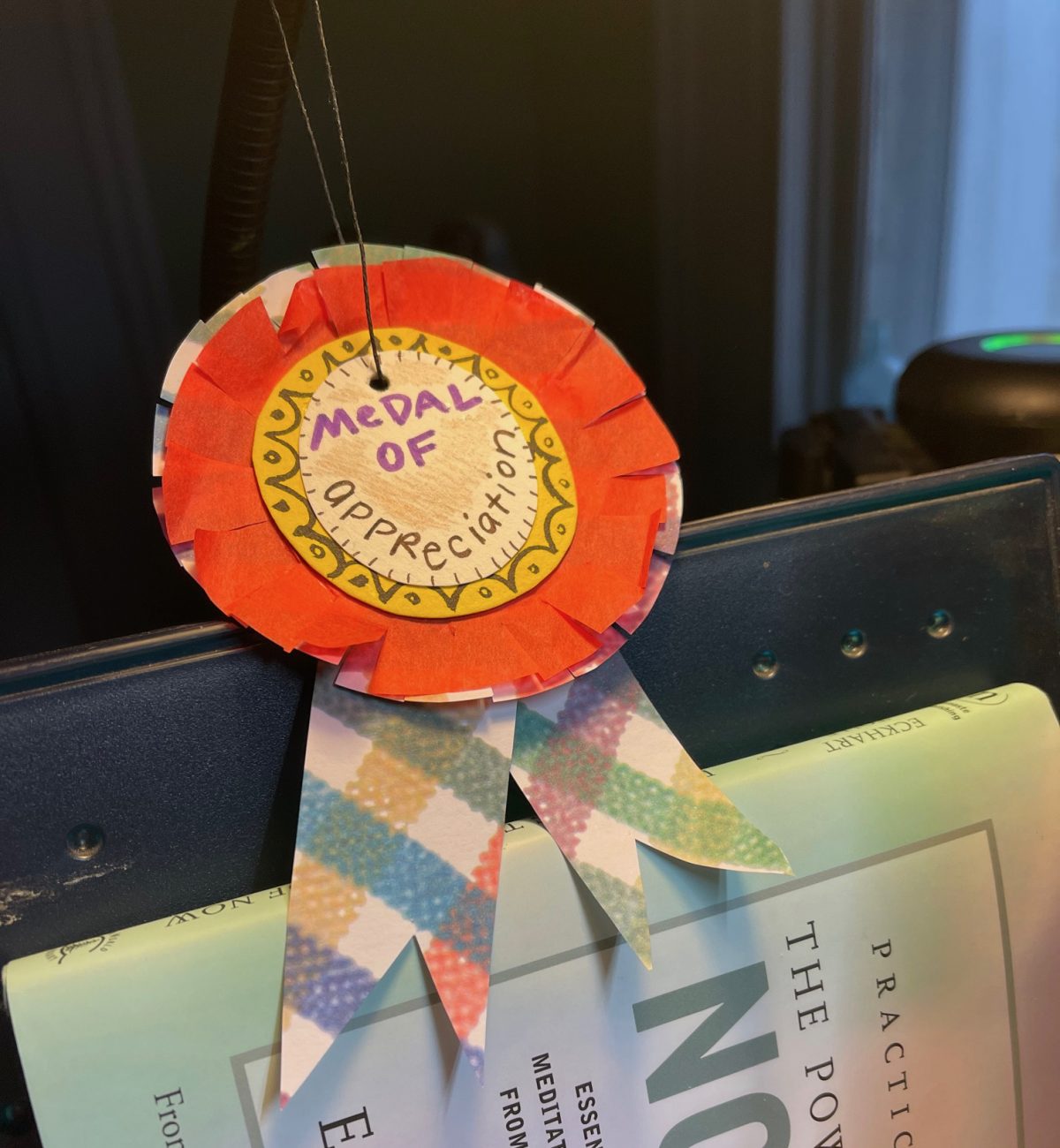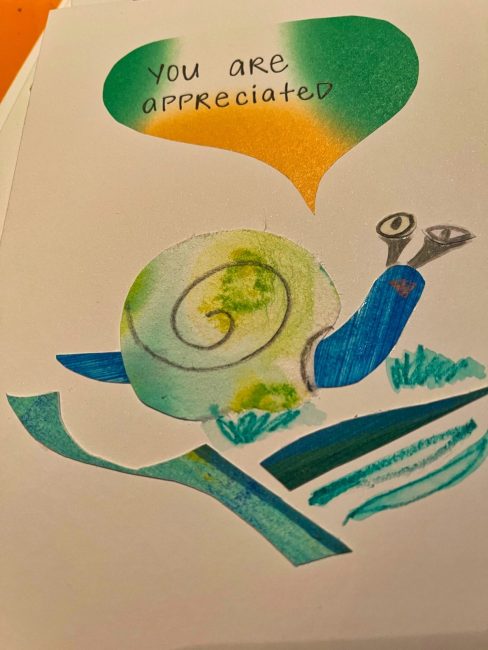I know a very good woman who is generous in her gifts to others.
She was in the Army Of Good from the first and rarely misses a chance to help someone whenever she gets a chance. I appreciate her very much and tell her so.
Whenever she contributes or donates, she is quite open about expecting something in return – acknowledgment, an appreciation, a card, a message.
She says it’s just good manners. It rarely happens.
She says this is what her mother taught her is the right thing to do, and that’s what she expects.
And she’s right, of course. Psychologists say a human being’s greatest need is to feel appreciacted.
Most of the time, the recipients of her gifts can’t respond – they may not speak English, they may not have computers, stationery, or stamps, they may be shy, or even afraid, they may be too bettered and distracted. For some, the very idea of a stranger far away sending money or gifts is almost unfathomable.
I have learned that writing a thank you message is a cultural tradition that demands certain skills and material, from language to cards to stamps. Poverty is a discouraging thing; it changes the very colors of the world. When you can’t feed your kids or pay your car insurance or electric bill, the world sometimes shrinks into fear and confusion.
The manners I was taught have little relevance in the world of hunger and fear and shame. It never occurred to me that the most vulnerable people are often shamed by even acknowledging their needs.
People often – and quite understandably – want to know if their message or letter or gift arrived and was appreciated.
That is often quite impossible to do or keep track of, and I also am wary of putting pressure on needy and vulnerable people to give something back in exchange for what they receive.
Obligation often frightens them; they are not sure they can pay back what they owe., and they are often embarrassed when they can’t respond.
Acknowledgment can frighten and deter them. Some are terrified of upsetting or offending someone. Everyone seems more powerful than they are. I find that the work with the Mansion residents and the refugee families asks me to cleanse myself of expectation.
The gift begins and ends with the giving, there is no possible reward.
I do it for the same reason most of you do it, because it feels good to do it and because it is good to do.
As Mother Teresa said, the only reward is Heaven.
In Matthew 18:3, Jesus tells his followers: “You know that among the gentiles the rulers lord it over them, and great men make their authority felt; among you, this is not to happen. No, anyone who wants to become great among you must be your servant, and anyone who wants to be first among you must be your slave…”
Despite my donor’s irritation, she never fails to help, and I admire her both for her desire for acknowledgment and her refusal to let that keep her from doing good.
I know better than to do things for people in order to be appreciated, thanked, or honored, at least not consciously.
Demanding acknowledgment from people who can’t really provide it sometimes an unintentional exertion of power and dominance; I don’t feel right asking it.
There are no strings attached to what I do or what we do. You do it and expect nothing back.
Still, it lifts the heart when people can and do respond. I sent some food cards to a sick aide at the Mansion last week, and she texted me back, “you are my angel. I love you.” I didn’t expect it, and I don’t ask for it. But it felt good.
My response to this issue of acknowledgment is to try to spread appreciation around. If they can’t do it, I can’t do it.
People in the Army Of Good send me messages of appreciation every day in their own way, so do some refugees and residents of the Mansion. I express my own appreciation back.
Emily Gold, the collage artist, has drawn up a bunch of “You have Appreciated Colleges” that I will send to donors when I can. I can’t send them to everyone, I can’t afford it, but I can respond to some.
My idea is that appreciation is infectious, like hope and good energy, we can spread it around to one another.
I’ve written several times about my love of Emily’s art, and that has drawn some attention and sales to her wonderful and unique work and her virtual collage classes. She’s become a hit on my blog.
Today, Maria and I visited Emily at the Bennington, Vt., Farmer’s Market. I wasn’t allowed in because of Covid-19 controls, Maria came in to give her some of our snails for her tank and to visit, and she came back with a “Medal Of Appreciation” and some new appreciation notecards. You can see Emily’s enchanting work here.
It is a small thing, but a big thing.
It is problematic to expect gratitude or acknowledgment; it is a sweet gift to get it, all the sweeter when it is not expected.



VERY WELL SAID, Jon. Of course we all like to be appreciated for what we do, but I thought your explanation was just superb. I especially liked these lines – “The gift begins and ends with the giving, there is no possible reward.
I do it for the same reason most of you do it, because it feels good to do it and because it is good to do.
There are no strings attached to what I do or what we do. You do it and expect nothing back.” Thank you for such a good post – it should help us all.
Thanks Charlotte..
Being one of those individuals who is a giver. I’m always amazed at the lack of acknowledgement one receives. A simple note via any medium stating that the gift was received is enough, but seldom done. I’d just like to know that it was received.
When I taught school I tried to instill acknowledgment in my students. At times I’d give my students a simple treat of a “Jolly Rancher”. You’d be amazed at the difficult time some students had saying thank you. I’d take it if I didn’t at least hear “Thank You”. I know many of the teachers in our school followed the same rule. Appreciation is not that complicated whether it be a student, immigrant or whoever. No excuses! The giver deserves an acknowledgement.
It’s a perfectly appropriate feeling Jim, but sometimes people in trouble just can’t do it. That is what empathy is, putting yourself in the shoes of another. Good manners are the privilege of the well off someties.
I inwardly smiled when I read your post describing a woman’s irritation with folks who don’t acknowledge another person’s kindness and generosity. I’ve experienced those very same reactions when my gift isn’t recognized. I’m not talking about folks who are dealing with a host of economic and social challenges but rather folks who are blessed with a myriad of material comforts.
Of course it is rude, thoughtless, ungracious, and just plain not nice to ignore a gift from someone else.
I learned to accept the fact that I can’t control other people only myself. That sounds simple but of course it’s lesson that took many years to accept.
The most important factor is that I want to be a person who is thoughtful, gracious, appreciative, and
nice. That’s the bottom line.
It’s wonderful to be appreciated but the true test of character is being able to do good deeds without being assured of any thanks. That’s harder.
People who struggle with poverty, lack, and insecurity rarely have the luxury of reveling in big thanks or gestures. I am sure it takes all their mental and physical energy to keep it all together. Those who can bless someone else mostly understand that the gift of giving is a gift to themselves as well. We are our brother’s keepers. With thanks for all you do.
I give a gift because want to, not because I expect affirmation or appreciation. A true gift is given with no strings attached and no expectations beyond the benefit to the recipients.
Amen to you message, Refugees and others have enough troubles without being expected to write notes to helpers. From my point of view these needy people, especially the children should not have been, through no fault of their own, been placed in such a dire position of need!
God bless the Army of Good, You, Maria, Sue Silverstein and others who are working tirelessly, and selflessly to help wherever it is needed.
Interesting views. I was also raised to write a thank you note when someone gave you a gift. This was considered good etiquette. I still believe in it. Different circumstances require different actions. A person or group of persons struggling do not write thank you notes. That’s fine, I get that. A gift basket to a student at the end if the year, checks for students even though they were just 20-25 dollars. A gift card to a pregnant teacher, 25.00. A bottle of wine to a teacher who didn’t win one, every one of those people know enough to jot a thank you. It acknowledges the gift. I am half in the old world half in the new world but on that but if banners I remain old world.
I think we help for its own sake, not for any reward…manners are a class thing, the poor aren’t always able to carry out the niceities..